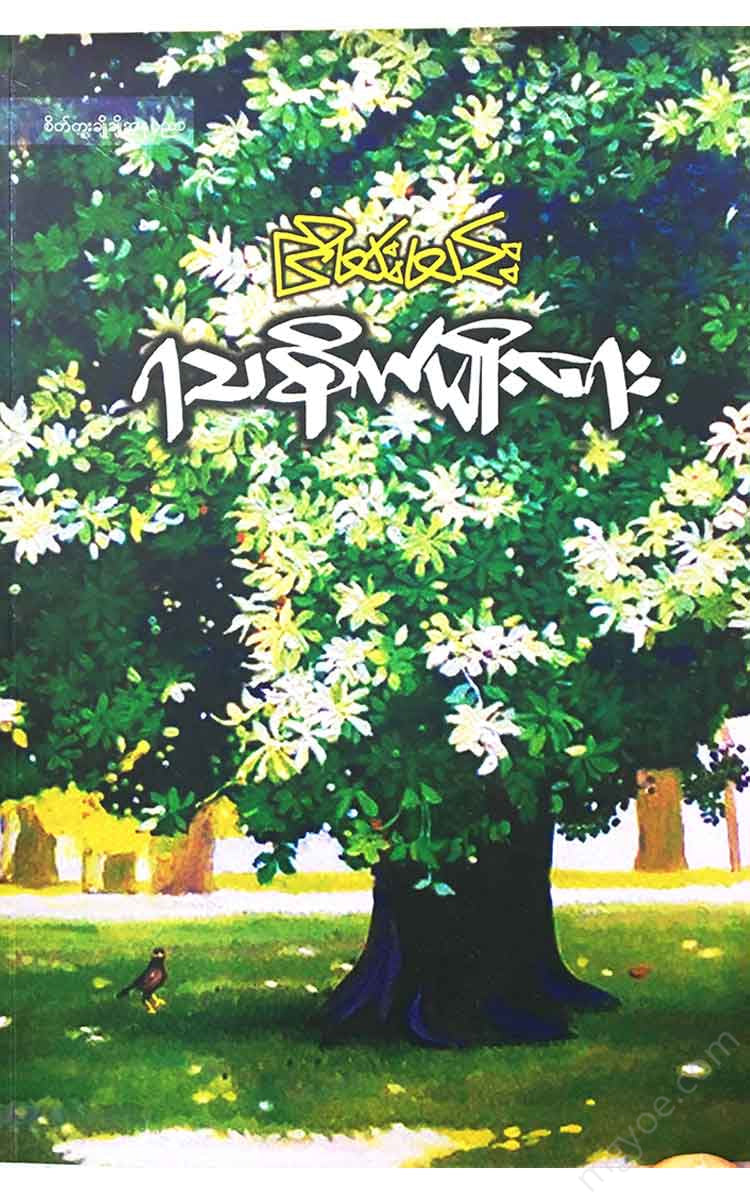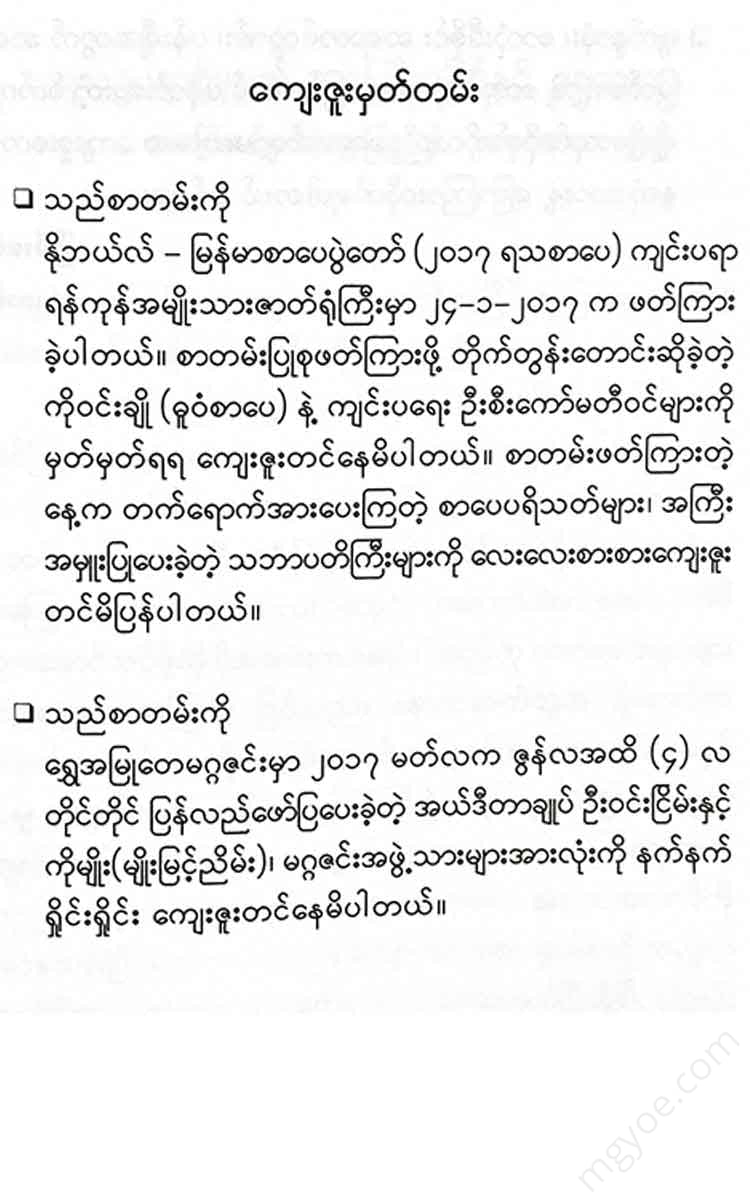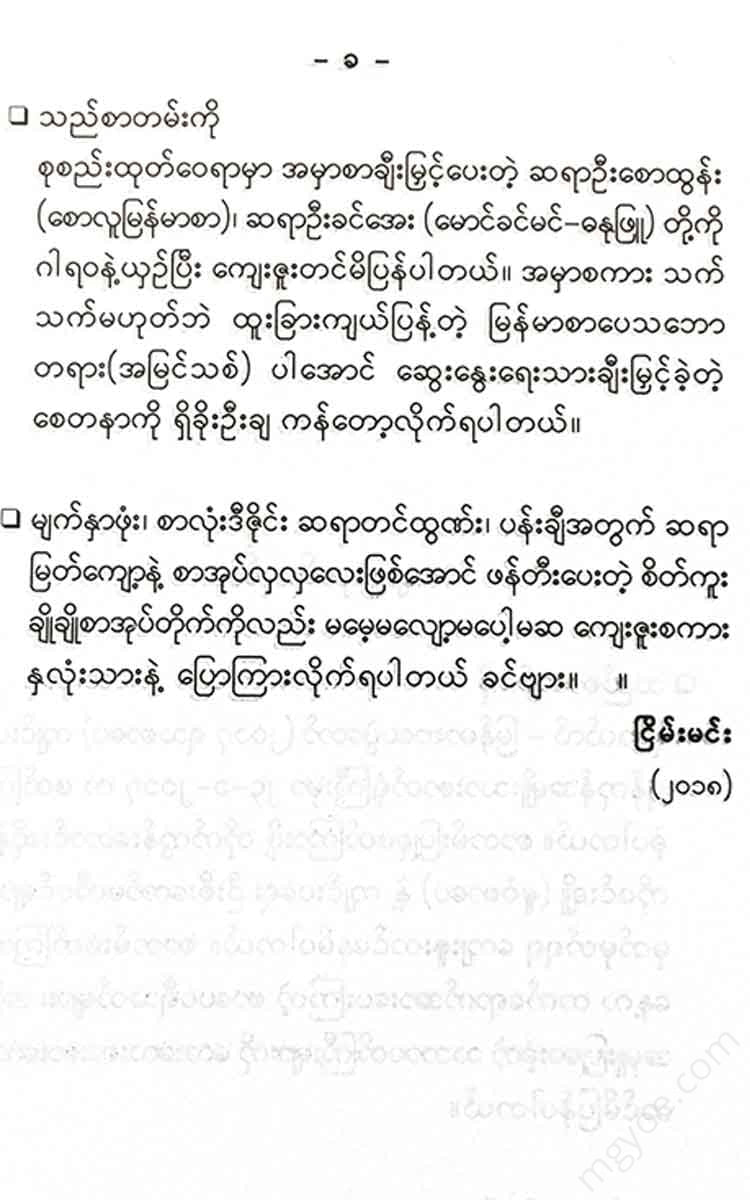စိတ်ကူးချိုချိုစာပေ
Nyein Min - Rasa Farming
Nyein Min - Rasa Farming
Couldn't load pickup availability
“There is a lack of enthusiasm in the classrooms today,” said a Burmese teacher worriedly.
If he is worried, he should be worried. In teaching Burmese, teachers often focus more on teaching students to memorize the content of the text rather than on teaching them to enjoy the text, to taste it, and to feel the taste of the text. The result is that students learn by rote, and they develop a bad habit of memorizing everything they learn. When they learn by rote, they also develop a habit of rewriting the text they have memorized. The teacher focuses on the information. The student memorizes the notes and takes the exam. If they have enough notes, they don't take the textbooks. The teacher doesn't take the textbooks. He doesn't read them. He doesn't explain the text to make it taste good. The student doesn't feel the taste of the text. In this way, the students no longer have a sense of rhythm, and the nine rhythms become nine types of information to memorize.
In this situation, Saya Nyein Min's "Ratha Farming" is not too late. It is just in time."
2
Taste is a taste that is felt in the mind, so it is subtle. It is a taste that cannot be obtained in the material world (the outside world). In the material world, a pleasant taste arises when the mind experiences a pleasant sensation (iṭhājāna). We all know that if the mind experiences an unpleasant sensation (anīthājāna), a pleasant taste cannot arise. The taste that literature and art provide, on the other hand, also arises a pleasant taste even when the unpleasant sensation is present. For example, when you read a novel and feel sorry for the pitiful girl in the painting, you often feel the tears flowing and feel the pleasure of those tears in your mind.
When reading a scary ghost story, we feel a sense of terror and dread, and we enjoy the thrill of that terror. When we hate a villain in a movie, we enjoy his acting. When we read violent scenes in martial arts, we enjoy the thrill of that thrill. These are unique sensations that cannot be found in the physical world. That is why the nine emotions include four emotions that are related to the negative emotions: compassion (pity), fear (fear), disgust (disgust), and cruelty (harshness).
Therefore, in the classroom, we need to teach students to really feel the taste of literary works such as poetry, short stories, novels, plays, and essays. Simply putting the things to memorize in the brain will bring out the meaning. Only when we can send them to the heart will we be able to experience the meaning.
3
Today is the IT era, and there are many opportunities to learn and acquire various knowledge and skills. There are many situations where young people can be rich in knowledge and develop their brains. On the one hand, it develops the brain, and on the other hand, it develops the heart of young people by experiencing the taste of literature such as poetry, drama, essays, etc.
It is also necessary to cultivate and develop good intentions in the heart, such as love, compassion, sympathy, aversion to injustice, aversion to justice, aversion to wrongdoing, aversion to what is right, and a desire to serve the common good. In other words, it is necessary to cultivate the habit of enjoying and experiencing the taste of literature and art, in other words, to cultivate the habit of being sensitive to taste.
4
Today, most young people are obsessed with knowledge and learning, but they are very much alienated from nature. Since they did not have the habit of reading novels and poems from a young age, their hearts have become harsh. They have become wild. They do not know that it is good to love someone when they find someone cute. They do not know how to respect someone who deserves respect. They laugh at the pitiful, follow injustice and injustice, and prioritize their own interests over the common good. When they grow up with such feelings, the situation worsens to the point of being involved in the murders, robberies, and rapes that we often hear about today. As a teacher worries, nature is not only lost in the classroom, but it is even worse, as Saya Nyein Min worries, it is in a state where nature is lost in the hearts of the people.
5
In this paper, Saya Nyein Min calls for the revival of the almost lost lotuses not only in the classroom but also in the hearts of the people, with the slogan “Ratha cultivation”. Teachers act as pioneers and guide students to cultivate the feeling of love for lotuses and good intentions in their young hearts, and discuss the ways to do and avoid them, based on personal experiences. This paper clearly “illuminates” the vision and dedication of a good lotus gardener who wants to decorate the world with lotuses, who wants lotuses to bloom and spread.
I am reminded of a saying by the monk Ashin Disha Pa Mokkha, who went to China as an ambassador during the Bagan period, who compared the Mongol emperor Kublai Khan to a gardener. "A man who plants a garden waters the trees and makes them grow. The shoots do not wither."
Saya Nyein Min, the gardener who cultivates the rasa, also wishes that the rasa garden will continue to blossom and flourish, without breaking any branches or branches, and that he will continue to pour forth the pure water of vision and generosity.
Maung Khin Min (Dhanuphuy)
14-7-2018







